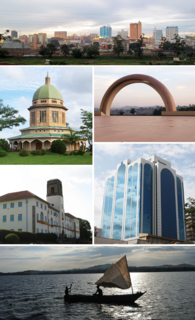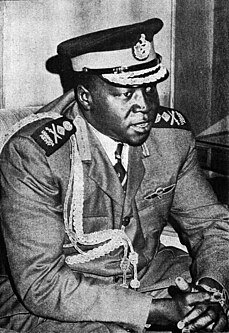
Kampala is the capital and largest city of Uganda. The city is divided into five boroughs that oversee local planning: Kampala Central Division, Kawempe Division, Makindye Division, Nakawa Division, and Rubaga Division. Surrounding Kampala is the rapidly growing Wakiso District, whose population more than doubled between 2002 and 2014 and now stands at over 2 million.

The Uganda Peoples' Defence Force (UPDF), previously known as the National Resistance Army, is the armed forces of Uganda. From 2007 to 2011, the International Institute for Strategic Studies estimated the UPDF had a total strength of 40,000–45,000 and consisted of land forces and an air wing.

Idi Amin Dada Oumee was a Ugandan politician and military officer. He served as the President of Uganda from 1971 to 1979.

Apollo Milton Obote was a Ugandan political leader who led Uganda to independence in 1962 from British colonial administration. Following the nation's independence, he served as Prime Minister of Uganda from 1962 to 1966 and President of Uganda from 1966 to 1971, then again from 1980 to 1985. He was overthrown by Idi Amin in 1971, but regained power after Amin's 1979 overthrow. His second period of rule was marred by repression and the deaths of many civilians as a result of a civil war known as the Ugandan Bush War.

Yoweri Kaguta Museveni is a Ugandan politician who has been President of Uganda since 1986. Museveni was involved in rebellions that toppled notorious Ugandan leaders Idi Amin (1971–79) and Milton Obote (1980–85) before capturing power in the 80s. In the mid to late 1990s, Museveni was celebrated by the West as part of a new generation of African leaders. During Museveni's presidency, Uganda has experienced relative peace and significant success in battling HIV/AIDS. At the same time, Uganda remains a country suffering from high levels of corruption, unemployment and poverty. Museveni's presidency has been marred by involvement in the civil war in the Democratic Republic of the Congo and other Great Lakes region conflicts; the rebellion in Northern Uganda by the Lord's Resistance Army which caused a drastic humanitarian emergency; and the suppression of political opposition and constitutional amendments scrapping presidential term limits (2005) and the presidential age limit (2017), thus enabling the extension of his rule. These have been a concern to domestic and foreign commentators.

Joseph Rao Kony is the leader of the Lord's Resistance Army (LRA), a guerrilla group that formerly operated in Uganda.

Uganda is divided into 127 districts and the capital city of Kampala, which are grouped into four administrative regions.

The Uganda national football team, nicknamed The Cranes, is the national team of Uganda and is controlled by the Federation of Uganda Football Associations. Their best finish in the Africa Cup of Nations was second in 1978.

The system of education in Uganda has a structure of 7 years of primary education, 6 years of secondary education, and 3 to 5 years of post-secondary education. The government of Uganda recognizes education as a basic human right and continues to strive to provide free primary education to all children in the country. However, issues with funding, teacher training, rural populations, and inadequate facilities continue to hinder the progress of educational development in Uganda.

Ugandan cuisine consists of traditional and modern cooking styles, practices, foods and dishes in Uganda, with English, Arab, and Asian influences.

The Uganda–Tanzania War, known in Tanzania as the Kagera War and in Uganda as the 1979 Liberation War, was fought between Uganda and Tanzania from October 1978 until June 1979, and led to the overthrow of Idi Amin's regime. Idi Amin's forces included thousands of troops sent by Libya.
The Ugandan Bush War, also known as the Luwero War, the Ugandan civil war or the Resistance War, was a civil war fought in Uganda between the Uganda National Liberation Army (UNLA) and a number of rebel groups, most importantly the National Resistance Army (NRA), from 1980 to 1986.

The Lord's Resistance Army (LRA), also known as the Lord's Resistance Movement, is a rebel group and heterodox Christian group which operates in northern Uganda, South Sudan, the Central African Republic, and the Democratic Republic of the Congo. Originally known as the United Holy Salvation Army and Uganda Christian Army/Movement, its stated goals include establishment of multi-party democracy, ruling Uganda according to the Ten Commandments, and Acholi nationalism, though in practice "the LRA is not motivated by any identifiable political agenda, and its military strategy and tactics reflect this". It appears to largely function as a personality cult of its leader Joseph Kony, a self-declared prophet whose leadership has earned him the nickname "Africa's David Koresh".
Stanbic Bank Uganda Limited (SBU) is a commercial bank in Uganda and is licensed by the Bank of Uganda, the national banking regulator.
Guaranty Trust Bank (Uganda), commonly referred to as GT Bank (Uganda), is a commercial bank in Uganda. It is one of the commercial banks licensed by Bank of Uganda, the central bank of that country and the national banking regulator.
Equity Bank Uganda Limited (EBUL), is a commercial bank in Uganda. It is licensed by the Bank of Uganda, the central bank and national banking regulator. EBUL is a subsidiary of Equity Group Holdings Limited, a financial services conglomerate with headquarters in Kenya and subsidiaries in six countries of the African Great Lakes Region.

Visitors to Uganda must obtain a visa on arrival to Uganda or from one of the Ugandan diplomatic missions, unless they come from one of the visa exempt countries. All visitors must hold a passport valid for 6 months.
Miss Uganda is a national beauty pageant in Uganda. The reigning queen Quiin Abenakyo was crowned on 10 August 2018 at a ceremony at the Kampala Serena Hotel.
















